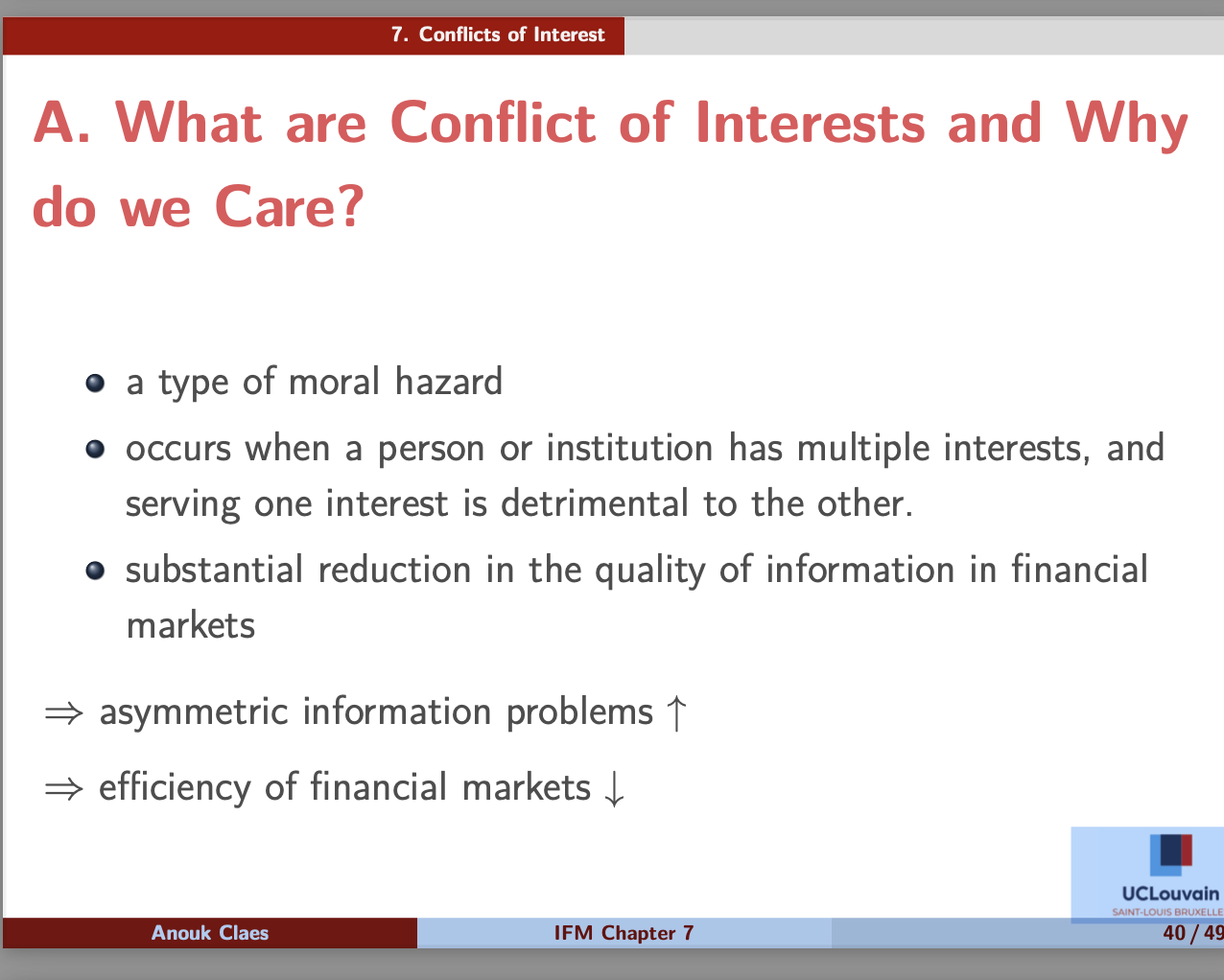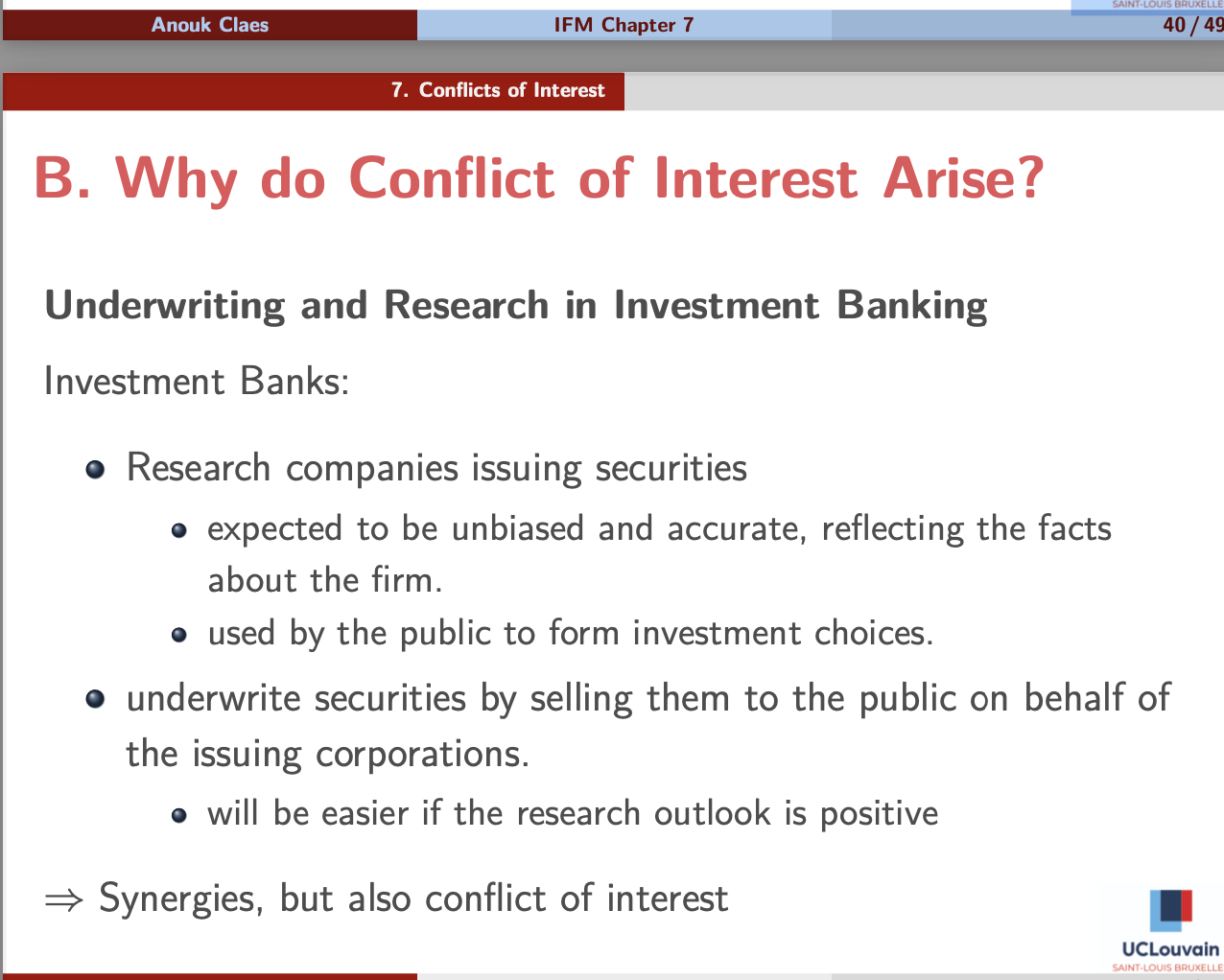IFM - chapter 7 - Why do financial institutions exist?
1/28
There's no tags or description
Looks like no tags are added yet.
Name | Mastery | Learn | Test | Matching | Spaced | Call with Kai |
|---|
No analytics yet
Send a link to your students to track their progress
29 Terms
what is the financial system and what does it include?
The financial system is a collection of institutions, markets, instruments, and regulatory frameworks that facilitate the flow of funds between savers and borrowers. It includes banks, stock markets, insurance companies, and investment firms, all serving to allocate resources and manage risk in the economy.
Are stocks the main source of external financing for businesses?
No, stocks are not the main source; businesses typically rely more on debt financing such as loans and bonds.
Who are the most important sources of external funds for businesses?
Financial intermediaries, especially banks.
what is indirect finance and how does it compare to direct finance?
Indirect finance involves financial intermediaries, where funds flow from savers to borrowers through institutions like banks, as opposed to direct finance where borrowers obtain funds directly from savers without intermediaries.
Do all businesses have easy access to securities markets?
No, only large, well-established corporations do.
What is collateral in financial terms?
Collateral refers to an asset or property pledged as security for a loan or credit, ensuring repayment to the lender in case of default.
How are debt contracts usually structured?
As complicated legal documents with restrictions on borrower behavior.
How do financial intermediaries reduce transaction costs?
Use economies of scale (e.g., mutual funds)
Develop expertise
Provide liquidity to investors
What’s the difference between symmetric and asymmetric information?
Symmetric: all parties have the same information
Asymmetric: information is unevenly distributed; can lead to problems like adverse selection and moral hazard
What is adverse selection?
A situation in which buyers and sellers have different information, leading to a market where high-risk participants are more likely to participate, often resulting in the least desirable outcomes.
what is moral hazard?
Moral hazard refers to a situation where one party is involved in risky behavior because they do not have to bear the full consequences of that risk, often due to an information imbalance.
what’s the agency theory?
a concept in economics that focuses on the optimal form of contract to control relationships between a principal and an agent. The theory aims to address the challenges that arise when the principal and agent have different goals and risk preferences.
whats meant with lemons problem in used cars?
If we can’t distinguish between “good” and “bad” (lemons) used cars, we are willing pay only an average of good and bad car values
⇒ Good cars won’t be sold
⇒ The used car market will function inefficiently.
what are 4 tools to help solve the adverse selection (lemons) problem?
Private Production and Sale of Information
Free-rider problem interferes with this solution
Government Regulation to Increase Information
Example: annual audits of public corporations (although Enron is an example of why this does not eliminate the problem)
Financial intermediation
Analogy to solution to lemons problem provided by used car
dealers
Avoid free-rider problem by making private loans
⇒ Large firms are more likely to use direct instead of indirect financing
Collateral and Net Worth
Adverse selection interferes with the functioning of financial markets only
- if a lender suffers a loss
- when a borrower is unable to make loan payments = if theborrower defaults.
whats free-rider problem?
The free-rider problem occurs when people who do not pay for information take advantage of the information that other people have paid for.
whats an audit?
An audit: accounting firms certify that the firm is adhering to standard accounting principles and disclosing accurate information about sales, assets, and earnings.
whats the pecking order hypothesis?
describes how firms prioritize funding sources. It posits that companies prefer to use internal funds (retained earnings) first, followed by debt financing, and equity issuance as a last resort. This "pecking order" is influenced by factors like information asymmetry and the costs associated with external financing.
what is the principal agent problem?
The principal-agent problem refers to the difficulties that arise when one party (the principal) delegates decision-making authority to another party (the agent), who has different interests than the principal, potentially leading to conflicts and inefficiencies.
Result of separation of ownership by stockholders (principals) from control by managers (agents)
Managers act in own rather than stockholders’ interest
what are tools to help solve the principal agent problem?
production of information: monitoring
auditing the firm frequently and checking on what the management is doing.
costly state verification: expensive in terms of time and money
Government regulation to increase information
laws to force firms to adhere to standard accounting principles that make profit verification easier.
pass laws to impose stiff criminal penalties on people who
commit the fraud of hiding and stealing profits.
Financial Intermediation e.g. venture-capital and private equity firms
insist on having their own people participate as members of the board of directors of the new business so that they can keep a close watch on the new firm’s activities
the equity in the business they have bought is private — not marketable to anyone except the venture-capital and private-equity firms.
Debts contracts
A contractual agreement by the borrower to pay the lender fixed dollar amounts at periodic intervals.
Only in a state of default is there a need for the lender to verify the state of the firm’s profits
⇒ less frequent need to monitor the firm
⇒ the lower cost of state verificati
what is a venture - capital firm?
pools the resources of its partners and uses the funds to help budding entrepreneurs start new businesses.
whats a private - equity firm?
has a similar structure to that of a venture-capital firm, but instead of
investing in new businesses, it buys the shares of existing corporations
what are some tools to help solve moral hazard in debt contracts?
net worth (aka “skin in the game” and owner has more to loose) and collateral
Net worth and collateral make the debt contract incentive compatible = aligns the incentives of the borrower with those of the lender
Monitoring and Enforcement of Restrictive Covenants
4 types:
Discourage undesirable behavior, Encourage desirable behavior, Keep collateral valuable, Provide information
Financial intermediation
Banks and other intermediaries have special advantages in monitoring
ability to avoid the free-rider problem as long as they make primarily private loans.
receives the benefits of monitoring and enforcement and will work to shrink the moral hazard problem inherent in debt contracts.
whats economies of scope?
Increased business that can be achieved by offering many products to the
same customer.
what are conflicts of interests?

what conflicts of interest arise from investment banks?
1⃣ Research
They analyze companies and write research reports.
These reports are supposed to be unbiased and accurate.
The public uses these reports to decide whether to invest in a company.
2⃣ Underwriting
They also help companies sell new securities (e.g. IPO = Initial Public Offering, or new bond issues).
The bank earns fees by selling these securities to investors.
→ This process is easier if the company looks attractive to investors → which is influenced by positive research reports.

what is meant by spinning?
👉 When a company goes public (IPO), its shares are often in very high demand → the shares often go up a lot on the first day → very profitable for those who get early access.
👉 Investment banks decide who gets these valuable IPO shares.
👉 Spinning happens when an investment bank gives IPO shares to top executives (CEOs, CFOs, etc.) of other companies personally — not to their company, but to them as individuals.
👉 Why? → To "bribe" them indirectly:
In exchange, the bank hopes these executives will send future business (like M&A deals, underwriting, etc.) to the bank.
The executive personally profits when the IPO shares jump.
what do auditors do?
Auditors
check the assets and books of a firm
ensure the quality and accuracy of the information.
Goal: unbiased opinion of the firm’s financial health.
what do consultants do?
Consultants
help firms with variety of managerial, strategic, and operational projects.
high fees
what are credit ratings?
reflect the probability of default to determine the creditworthiness of particular debt securities.
⇒ play a major role in the pricing of debt securities and in the regulatory process.